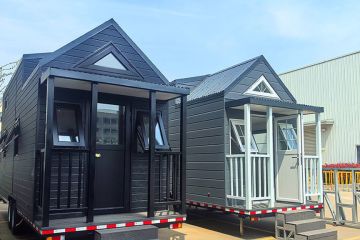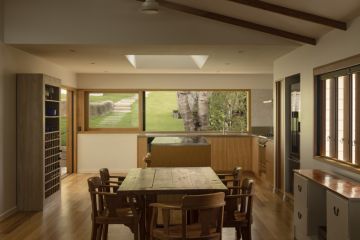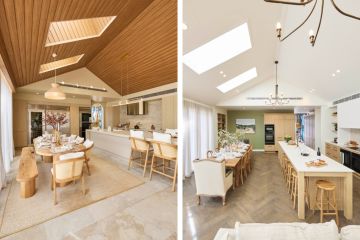Choosing the right dog for you and your home

Don’t let allergies, apartment living, travel, having a young family or being retired stop you from becoming a dog owner. The rewards are priceless and there is a loveable breed of dog suited to each and every household.
We spoke to Dr David Neck of the Australian Veterinary Association (AVA) to find out which breeds are best-suited to various lifestyles and budgets.
What should a potential dog owner ask themselves if contemplating a four-legged addition to the family?
Dr David Neck: The biggest question is how much time will the family have to spend with the pet? We can find dogs suitable for outdoors, indoors, apartments, allergy sufferers, introverts, extroverts, single people, families of 10 and so forth, but no dog is suitable for someone who doesn’t have the time (or inclination) to devote to their pet.
To a certain degree this includes people who travel much of the time, but good care is available, including pet-sitters and boarding kennels, if friends or family aren’t available. People who travel a lot (especially if they live alone) probably benefit more from the company of having a pet when they are at home!
Yard size and the availability of good exercise areas dictates, to some degree, the size and energy level of the dog people should choose.

Which breeds are best suited to a unit or home with a yard?
Dr Neck: Generally, smaller dogs do better in smaller living areas, but, really, size doesn’t matter if there is a generous amount of time dedicated to exercise and interaction. Some smaller breeds have HEAPS of energy (for example, Jack Russell Terriers) and so they are not especially suited to smaller spaces, unless they can be taken out for serious running. Smaller homes can concentrate the hair-shedding problem, so picking long-haired or woolly-coated dogs is possibly smarter as they don’t shed as much as short-haired breeds.

And what about allergy sufferers?
Dr Neck: Dogs with woolly coats (Poodles, Bichons, Lagottos and Portuguese Water Dogs) are recognised as being better for allergy sufferers as they don’t shed hair, but they come with the downside of requiring regular clipping and grooming. Chinese Crested Dogs have no hair at all, but aesthetically are not for everyone!

Which breeds are best if you have small children?
Dr Neck: The classic ‘family’ dogs are retrievers and Labradors. I have found Staffordshire Bull Terriers to be excellent with children. Boxers are great with children but have high energy levels and can knock small children over. However, I would never recommend children be left alone with dogs unsupervised – I personally have a Golden Retriever, and a four-year-old and a three-year-old, and they still don’t interact unsupervised.
Are there dog breeds better suited to an active (or not-so-active) owner?
Dr Neck: Dogs suited to active people include the Border Collie, Kelpie, Boxer, Weimaraner and Vizsla. Those more suited to sedentary people include the Pug, Cavalier King Charles Spaniel and Griffon.

Do I have enough time for a pooch?
Dr Neck: I got my first dog to judge if I would have enough time to contemplate having children! This is a really hard question to answer – I think a minimum of 30–60 minutes per day for exercise and interaction is required. This doesn’t have to be specific dog walking or chasing a frisbee but needs to be genuine interaction. I get around this by taking my dog to work when I know I won’t have time in the evening. I think there should be lots more pet-friendly workplaces.
The other time factor to consider is the 10–15 year lifespan of most dogs. Many of my elderly clients are very worried about taking on a puppy that might outlive them, but they get tremendous rewards by taking on much older rescue dogs.

How much does it cost to own a dog?
Dr Neck: The RSPCA has some good figures available for this and suggests an average upwards of $25,000 for the lifetime of the animal, and around $900 minimum per year. This includes food and veterinary care.
Are some breeds more affordable than others?
Dr Neck: Small dogs almost always cost less. Less food, medicine is cheaper, even surgeries can be cheaper in smaller dogs (e.g. desexing). A general statement is that cross-breed dogs might be healthier than pedigree dogs, but I’m not certain I buy into that anymore. Breeders have done a really good job identifying breed traits that lead to poor health outcomes and eliminating those from their breeding lines.
Buy a puppy or rescue a four-legged friend
Dr Neck: Investigate the breeder well and try to ensure they have a good reputation and produce good welfare results. Don’t rely on a flashy website alone. ‘Puppy farms’ are hard to define, but you need to have a genuine satisfaction that animal welfare is high on the breeder’s agenda.
Rescuing a dog is very rewarding but doing some homework on why the dog needs rescuing is really important. Many dogs end up in shelters because they were unsuited to the previous owner’s circumstances and you don’t want to end up owning the same problems.

Go with your heart
Dr Neck: If we all drove the ‘correct’ car, it would be a mid-sized family 4-cylinder station wagon. There would be no place for convertibles, sports cars, V8 engines or personalised number plates. However, we all want a car that ticks our personal boxes. Owning a pet is much the same. Deep in our heart there is one breed that really appeals to us and ticks our boxes too. (Mine is a Land Rover Defender …)
Until we get the ‘right’ car or the ‘right’ dog, we probably won’t be satisfied with whatever else we have, even if it is the absolute best car or dog for the job. Now, the dog has to be marginally suited to our circumstances, but it is good to go with your heart with these decisions. The ‘right’ dog could be a 10 kg short-haired mixed-breed mutt, but some of us just need to drive Porsches.
I am all for dog breeds. If it were not for breeds, we would all have a wolf in the backyard and that wouldn’t be clever. I don’t like seeing some breeds get taken to physical extremes, but I think, in general, breeders are bringing the form of the dogs back towards good function, and that makes me happy.
For more information on looking after your pets, visit the AVA website.
We recommend
We thought you might like
States
Capital Cities
Capital Cities - Rentals
Popular Areas
Allhomes
More









